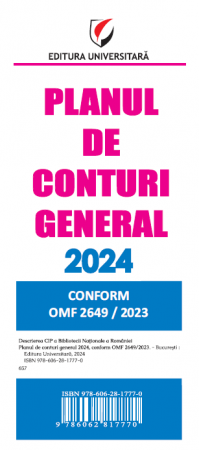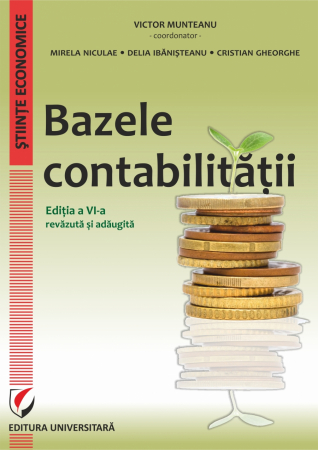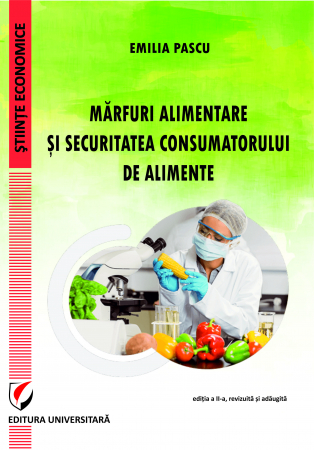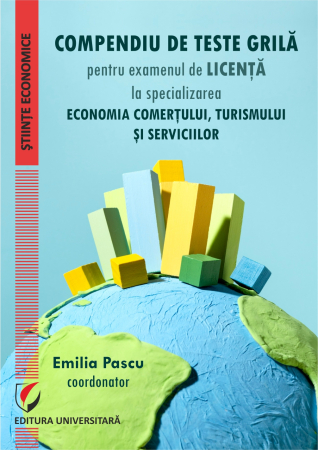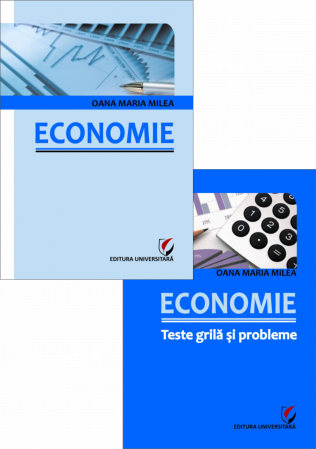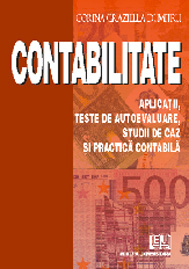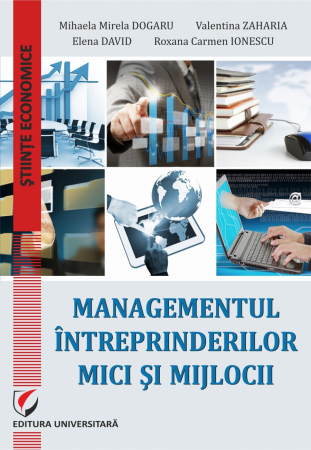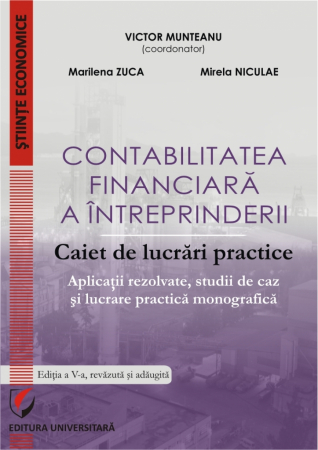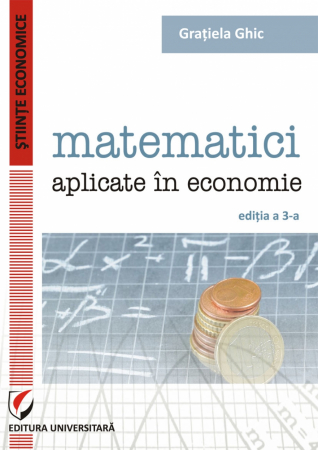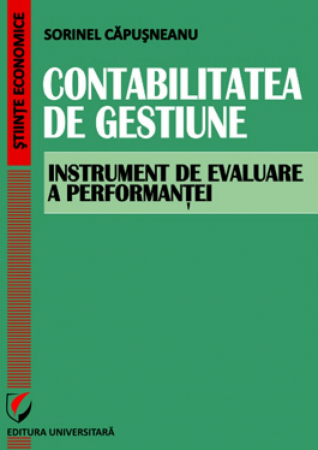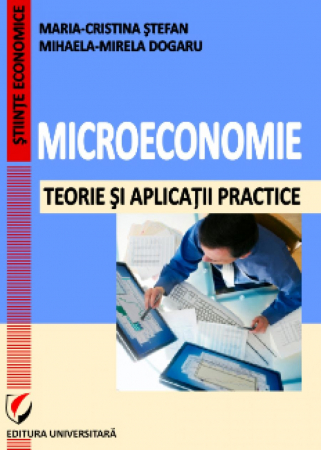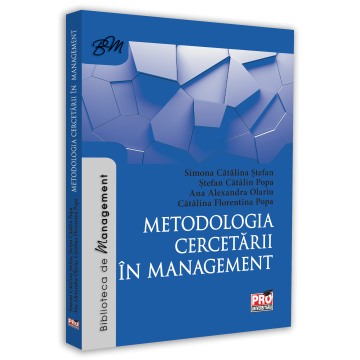Manuscript proposals: [email protected] / 0745 204 115 //// Tracking orders Individuals / Sales: 0745 200 357 / Orders Legal entities: 0721 722 783
6359.png) The Influence of Climate Change on Romania. Economic Impact and Prevention Measures at Regional Level - Andreea Constantinescu
The Influence of Climate Change on Romania. Economic Impact and Prevention Measures at Regional Level - Andreea Constantinescu
6359.png)
Publisher: Editura Universitară
Author: Andreea Constantinescu
ISBN: 978-606-28-0748-1
DOI: 10.5682/9786062807481
Publisher year: 2018
Edition: I
Pages: 424
Product Code:
9786062807481
Do you need help?
0745 200 357
- Description
- Download (1)
- Authors
- Content
- More details
- Reviews (0)
The present paper does not aim to maintain the fear generated by the effects of climate change, which was fueled by catastrophic conclusions, which occurred following predictive analyzes performed based on the scenario method. On the contrary, our position of principle is that climate threats, especially those to the regions of Romania, can be an opportunity to hold accountable all institutions involved in identifying, correlating and interpreting global trends, as they result from the estimated impact. in various scenarios. In this sense, the institutions, as well as all the factors interested in preventing the effects of climate change, will have to permanently strengthen their capacity to cope better with the situation, by urgently applying all necessary measures.
Given that climate change is accelerating in recent years, it could force around 200 million people to leave their homes by 2050. Also, the thermal expansion of the water and the melting of the ice cap and glaciers could lead to catastrophic floods, which will destroy coastal cities. Along with these, climate change will reduce crops, which will starve more than 20 million people in Asia, Africa and South America. At the same time, the increase in temperatures, precipitation and humidity globally will facilitate the spread of insects carrying contagious diseases, which will lead to the onset of real pandemics.
From this picture, extremely brief, we can still conclude that the pressure of climate change will be even greater on poorly developed countries, as is the case of Romania. Thus, against the background of the demographic trend, migration, poverty rate and corruption in our country, climate change is part of the risks and threats to national security, which requires their approach in a combined, inter and multidisciplinary. Therefore, the studies in this thematic area go beyond the simple level of problematization in order to fit into research directions in which the component of climate change is no longer analyzed separately, but in relation to the entire Romanian economic and social environment.
The importance and relevance of all these aspects increases considerably if we consider that climate change can lead not only to the irreversible deterioration of ecosystems and living conditions - thus sending humanity back in time - but also to the escalation of geopolitical conflicts. With such a potential risk to human peace, solidarity and cohesion across the planet, climate change requires an approach as documented as it is rigorous. It must contain a clear vision; to appeal to relevant concepts, to be based on coherent principles and to benefit from the contribution of instruments corresponding to the magnitude of climate change threats (...).
Given that climate change is accelerating in recent years, it could force around 200 million people to leave their homes by 2050. Also, the thermal expansion of the water and the melting of the ice cap and glaciers could lead to catastrophic floods, which will destroy coastal cities. Along with these, climate change will reduce crops, which will starve more than 20 million people in Asia, Africa and South America. At the same time, the increase in temperatures, precipitation and humidity globally will facilitate the spread of insects carrying contagious diseases, which will lead to the onset of real pandemics.
From this picture, extremely brief, we can still conclude that the pressure of climate change will be even greater on poorly developed countries, as is the case of Romania. Thus, against the background of the demographic trend, migration, poverty rate and corruption in our country, climate change is part of the risks and threats to national security, which requires their approach in a combined, inter and multidisciplinary. Therefore, the studies in this thematic area go beyond the simple level of problematization in order to fit into research directions in which the component of climate change is no longer analyzed separately, but in relation to the entire Romanian economic and social environment.
The importance and relevance of all these aspects increases considerably if we consider that climate change can lead not only to the irreversible deterioration of ecosystems and living conditions - thus sending humanity back in time - but also to the escalation of geopolitical conflicts. With such a potential risk to human peace, solidarity and cohesion across the planet, climate change requires an approach as documented as it is rigorous. It must contain a clear vision; to appeal to relevant concepts, to be based on coherent principles and to benefit from the contribution of instruments corresponding to the magnitude of climate change threats (...).
-
Influenta schimbarilor climatice asupra Romaniei. Impact economic si masuri de prevenire la nivel regional
Download
ANDREEA CONSTANTINESCU
Abbreviations and acronyms / 9
List of figures / 13
List of graphs / 13
List of tables / 15
List of annexes / 17
Introduction / 19
I. The dynamics of climate change / 38
I.1. Definitions, theories and conceptual delimitations / 38
I.1.1. Definitions of basic concepts in the field of climate change / 39
I.1.2. Theories of climate change / 40
I.1.3. Approaches and economic contributions in the field of climate change prevention / 43
I.1.4. The importance of the notion of resilience in preventing climate change, along with the notions of vulnerability, adaptation and mitigation / 45
I.1.5. Conceptual delimitations / 49
I.2. Factors and major causes of climate change / 55
I.3. Scenarios, forecasts and risks associated with climate change / 59
I.3.1. Climate change scenarios and models / 61
I.3.2. Climate risk and hazard / 62
II. GHG emissions analysis. Evolutions and forecasts / 66
II.1. The contribution of greenhouse gas emissions to climate change / 66
II.2. Evolution of GHG emissions worldwide / 67
II.2.1. Romania 's contribution to GHG / 69 emissions
II.2.2. The comparative situation of Romania 's contribution to GHG / 72 emissions
II.3. Forecast of GHG emissions / 78
III. The impact of climate change, with a special look at Romania / 82
III.1. Consequences of climate change / 84
III.1.1. Global consequences of climate change / 84
III.1.2. Regional consequences of climate change / 88
III.1.3. Local consequences of climate change in Romania / 89
III.2. The impact of climate change on the environment in Romania / 92
III.2.1. Specific conditions for the manifestation of climate change in Romania / 93
III.2.2. The impact of climate change on forests / 97
III.2.3. The impact of climate change on water / 103
III.2.4. The impact of climate change on biodiversity / 106
III.2.5. Preserving the quality of environmental factors / 109
III.2.6. Indicators of the quality of environmental factors / 112
III.3. The economic impact of climate change / 115
III.3.1. The most exposed sectors of the national economy to climate change / 117
III.3.2. Economic value of ecosystem services / 129
III.3.3. Establishing the costs of climate change / 132
III.3.4. Costs generated by manifestations of climate change in Romania / 136
III.4. The social impact of climate change / 140
III.4.1. Resource depletion and population growth amid climate change / 142
III.4.2. Social aspects of the economic impact of climate change / 147
III.4.3. Implications regarding the Social Responsibility of the enterprise / 152
III.4.4. Education on the consequences of climate change / 153
III.4.5. Quantification of Romania 's vulnerability to climate change / 155
IV. Policies and strategies for preventing climate change in the EU / 159
IV.1. History and evolution of climate change policy objectives / 160
IV.1.1. History of climate change prevention policies in the EU / 160
IV.1.2. Evolution of EU climate change objectives / 164
IV.1.3. Evaluation and monitoring of environmental policies within the EU / 167
IV.2. Climate change prevention policy. Interactions with other EU policies and the cost structure involved / 170
IV.2.1. The relationship between mitigation measures and those adapted to climate change / 171
IV.2.2. Climate change prevention in support of sustainable development / 176
IV.2.3. Climate change prevention in relation to the application of technological innovation and energy efficiency requirements / 178
IV.2.4. Costs of implementing climate change prevention measures / 181
IV.3. Renewable energy sources and boosting the green and circular economy / 185
IV.4. Economic and financial instruments at the disposal of climate change prevention policies / 190
IV.4.1. History and regulation of certification of energy produced from renewable sources / 192
IV.4.2. Comparisons regarding the subsidization of renewable energy through Green Certificates in different countries / 194
IV.4.3. Application of the White Certificates system in Europe / 197
IV.4.4. Destination of Emission Certificates / 200
IV.4.5. Financial instruments dedicated to climate change / 205
V. Policies and strategies for preventing climate change in Romania / 214
V.1. Implementing climate change policies in Romania / 215
V.1.1. The degree of symmetry of national strategies with those existing in the EU / 217
V.1.2. PNASC 2016-2020 - evolution in European context and critical analysis / 219
V.2. Climate change prevention policies in Romania / 230
V.2.1. Climate change mitigation policy in Romania / 231
V.2.2. The main strategies for adapting to climate change in Romania / 235
V.2.3. Monitoring and evaluation of adaptation strategies / 237
V.3. The evolution of energy from renewable sources in Romania / 240
V.4. Economic tools for preventing climate change in Romania / 249
V.4.1. Regulation of Green Certificates in Romania / 249
V.4.2. Romanian Green Certificates Market / 252
V.4.3. Renewable energy subsidization controversies / 257
V.4.4. Analysis of Romania's participation on the emissions certificates market / 260
V.5. Financial instruments for preventing climate change in Romania / 264
V.6. Analysis of the efficiency of economic instruments dedicated to the prevention of climate change in Romania / 267
VI. Analysis of the costs and benefits of climate change prevention measures adopted in Romania / 271
VI.1. Strategic coordinates of the National Action Plan for Climate Change 2016-2020 / 271
VI.2. Cost-Benefit Analysis of PNASC 2016-2020 / 272
VI.2.1. Objectives and methodology ACB / 272
VI.2.2. Financial analysis - Investments provided in PNASC for preventing the effects of climate change in Romania / 276
VI.2.3. Financial analysis - Costs of measures provided in PNASC for preventing the effects of climate change in Romania / 281
VI.2.4. Economic analysis - The benefits of the measures provided in PNASC for preventing the effects of climate change in Romania / 284
VI.2.5. Risk and sensitivity analysis / 287
VI.2.6. Conclusions of the Cost Benefit Analysis for PNASC / 292
VI.3. The cost of measures to prevent the effects of climate change in Romania / 294
VI.3.1. Cost of proposed GHG reduction measures / 297
VI.3.2. The cost of the adaptation measures proposed in PNASC 2012-2020 / 298
VII. Proposals and recommendations in completing and improving measures to prevent climate change in Romania / 302
VII.1. The possibility of streamlining measures to prevent climate change in Romania / 303
VII.1.1. Increasing the efficiency of mitigation measures / 303
VII.1.2. Efficiency of measures to adapt to climate change / 304
VII.2. Proposals derived from the Cost-Benefit Analysis of PNASC 2016-2020 / 307
VII.3. Personal contribution to climate change / 316
General conclusions / 319
Bibliography / 327
Annexes / 357
Glossary of terms / 418
List of figures / 13
List of graphs / 13
List of tables / 15
List of annexes / 17
Introduction / 19
I. The dynamics of climate change / 38
I.1. Definitions, theories and conceptual delimitations / 38
I.1.1. Definitions of basic concepts in the field of climate change / 39
I.1.2. Theories of climate change / 40
I.1.3. Approaches and economic contributions in the field of climate change prevention / 43
I.1.4. The importance of the notion of resilience in preventing climate change, along with the notions of vulnerability, adaptation and mitigation / 45
I.1.5. Conceptual delimitations / 49
I.2. Factors and major causes of climate change / 55
I.3. Scenarios, forecasts and risks associated with climate change / 59
I.3.1. Climate change scenarios and models / 61
I.3.2. Climate risk and hazard / 62
II. GHG emissions analysis. Evolutions and forecasts / 66
II.1. The contribution of greenhouse gas emissions to climate change / 66
II.2. Evolution of GHG emissions worldwide / 67
II.2.1. Romania 's contribution to GHG / 69 emissions
II.2.2. The comparative situation of Romania 's contribution to GHG / 72 emissions
II.3. Forecast of GHG emissions / 78
III. The impact of climate change, with a special look at Romania / 82
III.1. Consequences of climate change / 84
III.1.1. Global consequences of climate change / 84
III.1.2. Regional consequences of climate change / 88
III.1.3. Local consequences of climate change in Romania / 89
III.2. The impact of climate change on the environment in Romania / 92
III.2.1. Specific conditions for the manifestation of climate change in Romania / 93
III.2.2. The impact of climate change on forests / 97
III.2.3. The impact of climate change on water / 103
III.2.4. The impact of climate change on biodiversity / 106
III.2.5. Preserving the quality of environmental factors / 109
III.2.6. Indicators of the quality of environmental factors / 112
III.3. The economic impact of climate change / 115
III.3.1. The most exposed sectors of the national economy to climate change / 117
III.3.2. Economic value of ecosystem services / 129
III.3.3. Establishing the costs of climate change / 132
III.3.4. Costs generated by manifestations of climate change in Romania / 136
III.4. The social impact of climate change / 140
III.4.1. Resource depletion and population growth amid climate change / 142
III.4.2. Social aspects of the economic impact of climate change / 147
III.4.3. Implications regarding the Social Responsibility of the enterprise / 152
III.4.4. Education on the consequences of climate change / 153
III.4.5. Quantification of Romania 's vulnerability to climate change / 155
IV. Policies and strategies for preventing climate change in the EU / 159
IV.1. History and evolution of climate change policy objectives / 160
IV.1.1. History of climate change prevention policies in the EU / 160
IV.1.2. Evolution of EU climate change objectives / 164
IV.1.3. Evaluation and monitoring of environmental policies within the EU / 167
IV.2. Climate change prevention policy. Interactions with other EU policies and the cost structure involved / 170
IV.2.1. The relationship between mitigation measures and those adapted to climate change / 171
IV.2.2. Climate change prevention in support of sustainable development / 176
IV.2.3. Climate change prevention in relation to the application of technological innovation and energy efficiency requirements / 178
IV.2.4. Costs of implementing climate change prevention measures / 181
IV.3. Renewable energy sources and boosting the green and circular economy / 185
IV.4. Economic and financial instruments at the disposal of climate change prevention policies / 190
IV.4.1. History and regulation of certification of energy produced from renewable sources / 192
IV.4.2. Comparisons regarding the subsidization of renewable energy through Green Certificates in different countries / 194
IV.4.3. Application of the White Certificates system in Europe / 197
IV.4.4. Destination of Emission Certificates / 200
IV.4.5. Financial instruments dedicated to climate change / 205
V. Policies and strategies for preventing climate change in Romania / 214
V.1. Implementing climate change policies in Romania / 215
V.1.1. The degree of symmetry of national strategies with those existing in the EU / 217
V.1.2. PNASC 2016-2020 - evolution in European context and critical analysis / 219
V.2. Climate change prevention policies in Romania / 230
V.2.1. Climate change mitigation policy in Romania / 231
V.2.2. The main strategies for adapting to climate change in Romania / 235
V.2.3. Monitoring and evaluation of adaptation strategies / 237
V.3. The evolution of energy from renewable sources in Romania / 240
V.4. Economic tools for preventing climate change in Romania / 249
V.4.1. Regulation of Green Certificates in Romania / 249
V.4.2. Romanian Green Certificates Market / 252
V.4.3. Renewable energy subsidization controversies / 257
V.4.4. Analysis of Romania's participation on the emissions certificates market / 260
V.5. Financial instruments for preventing climate change in Romania / 264
V.6. Analysis of the efficiency of economic instruments dedicated to the prevention of climate change in Romania / 267
VI. Analysis of the costs and benefits of climate change prevention measures adopted in Romania / 271
VI.1. Strategic coordinates of the National Action Plan for Climate Change 2016-2020 / 271
VI.2. Cost-Benefit Analysis of PNASC 2016-2020 / 272
VI.2.1. Objectives and methodology ACB / 272
VI.2.2. Financial analysis - Investments provided in PNASC for preventing the effects of climate change in Romania / 276
VI.2.3. Financial analysis - Costs of measures provided in PNASC for preventing the effects of climate change in Romania / 281
VI.2.4. Economic analysis - The benefits of the measures provided in PNASC for preventing the effects of climate change in Romania / 284
VI.2.5. Risk and sensitivity analysis / 287
VI.2.6. Conclusions of the Cost Benefit Analysis for PNASC / 292
VI.3. The cost of measures to prevent the effects of climate change in Romania / 294
VI.3.1. Cost of proposed GHG reduction measures / 297
VI.3.2. The cost of the adaptation measures proposed in PNASC 2012-2020 / 298
VII. Proposals and recommendations in completing and improving measures to prevent climate change in Romania / 302
VII.1. The possibility of streamlining measures to prevent climate change in Romania / 303
VII.1.1. Increasing the efficiency of mitigation measures / 303
VII.1.2. Efficiency of measures to adapt to climate change / 304
VII.2. Proposals derived from the Cost-Benefit Analysis of PNASC 2016-2020 / 307
VII.3. Personal contribution to climate change / 316
General conclusions / 319
Bibliography / 327
Annexes / 357
Glossary of terms / 418
As in any research, the theoretical basis based on previous conclusions, must be a premise for further research on the issue, in our case, that of climate change. It needs as many economic analyzes and applications as possible to certify or reject its validity. Therefore, this paper includes, in addition to the indispensable theoretical part, some analyzes applied to the field of climate change prevention, whose results can be integrated later in research that will establish among its objectives the in-depth analysis of coordinates belonging to this field.
In this context, the research of the influence of climate change and their economic impact can only support the successful implementation of climate change mitigation and adaptation measures provided in the CRESC and PNASC Strategy 2016-2020, as well as, possibly, their completion and improvement. This becomes all the more stringent as the threats of climate change have become more and more present in Romania, mainly through the increase of dry periods, temperatures and the accentuation, at more and more frequent intervals, of extreme meteorological events. Also, the application of measures to prevent climate change at the regional level has become urgent due to severe droughts and violent storms in Romania, which has led to a drastic decrease in water resources (to 30% of a normal year) or in floods, often catastrophic, with loss of life and material damage (Acad. Romana, 2015).
We must also emphasize that the constant concern of some researchers from INCE for improving the connections between the most developed and least developed areas of Romania and facilitating the propagation of the beneficial effects of sustainable development on the whole territory, was an additional impetus for research. in front. This, given that the negative effects of climate change have a significant potential to widen the regional gap.
Given this particular research context, we consider that this paper is important because, on the one hand, it is, to our knowledge, the first study that analyzes, in the European context, the consistency of the two emblematic documents for Romania's alignment with EU for 2030, on the horizon of 2050: National strategy on climate change and economic growth based on low carbon emissions - CRESC and the National Action Plan 2016-2020 on climate change - PNASC2 and, on the other hand, tries based on analyzes to argue a set of proposals and recommendations that can be taken into account, including, on the occasion of the first revision of the content of the CRESC Strategy and / or PNASC, programmatic documents that are in the stage of external approval.
After a decade and a half of the 21st century, we can note that analysts who identified as a global trend the potentiation of major crises, unfortunately, correctly anticipated. According to recent synthetic analyzes, on the "short list" of the most alarming scenarios regarding the dangers that humanity is very likely to face until the middle of our century is, along with cyber or even nuclear war, the imminent confrontation with the disastrous effects of climate change.
However, the present paper does not aim to maintain the fear generated by the effects of climate change, which was fueled by catastrophic conclusions, resulting from predictive analyzes performed based on the scenario method. On the contrary, our position of principle is that climate threats, especially those to the regions of Romania, can be an opportunity to hold accountable all institutions involved in identifying, correlating and interpreting global trends, as they result from the estimated impact. in various scenarios. In this sense, the institutions, as well as all the factors interested in preventing the effects of climate change, will have to permanently strengthen their capacity to cope better with the situation, by urgently applying all necessary measures.
Given that climate change is accelerating in recent years, it could force around 200 million people to leave their homes by 2050. Also, the thermal expansion of the water and the melting of the ice cap and glaciers could lead to catastrophic floods, which will destroy coastal cities. Along with these, climate change will reduce crops, which will starve more than 20 million people in Asia, Africa and South America. At the same time, rising temperatures, rainfall and humidity globally will facilitate the spread of insects carrying contagious diseases, which will lead to the onset of real pandemics.
From this picture, extremely brief, we can still conclude that the pressure of climate change will be even greater on poorly developed countries, as is the case of Romania. Thus, against the background of the demographic trend, migration, poverty rate and corruption in our country, climate change is part of the risks and threats to national security, which requires their approach in a combined, inter and multidisciplinary. Therefore, the studies in this thematic area go beyond the simple level of problematization in order to fit into research directions in which the component of climate change is no longer analyzed separately, but in relation to the entire Romanian economic and social environment.
The importance and relevance of all these aspects increases considerably if we consider that climate change can lead not only to the irreversible deterioration of ecosystems and living conditions - thus sending humanity back in time - but also to the escalation of geopolitical conflicts. With such a potential risk to human peace, solidarity and cohesion across the planet, climate change requires an approach as documented as it is rigorous. It must contain a clear vision; to appeal to relevant concepts, to be based on coherent principles and to benefit from the contribution of instruments corresponding to the magnitude of climate change threats (...).
Author
In this context, the research of the influence of climate change and their economic impact can only support the successful implementation of climate change mitigation and adaptation measures provided in the CRESC and PNASC Strategy 2016-2020, as well as, possibly, their completion and improvement. This becomes all the more stringent as the threats of climate change have become more and more present in Romania, mainly through the increase of dry periods, temperatures and the accentuation, at more and more frequent intervals, of extreme meteorological events. Also, the application of measures to prevent climate change at the regional level has become urgent due to severe droughts and violent storms in Romania, which has led to a drastic decrease in water resources (to 30% of a normal year) or in floods, often catastrophic, with loss of life and material damage (Acad. Romana, 2015).
We must also emphasize that the constant concern of some researchers from INCE for improving the connections between the most developed and least developed areas of Romania and facilitating the propagation of the beneficial effects of sustainable development on the whole territory, was an additional impetus for research. in front. This, given that the negative effects of climate change have a significant potential to widen the regional gap.
Given this particular research context, we consider that this paper is important because, on the one hand, it is, to our knowledge, the first study that analyzes, in the European context, the consistency of the two emblematic documents for Romania's alignment with EU for 2030, on the horizon of 2050: National strategy on climate change and economic growth based on low carbon emissions - CRESC and the National Action Plan 2016-2020 on climate change - PNASC2 and, on the other hand, tries based on analyzes to argue a set of proposals and recommendations that can be taken into account, including, on the occasion of the first revision of the content of the CRESC Strategy and / or PNASC, programmatic documents that are in the stage of external approval.
After a decade and a half of the 21st century, we can note that analysts who identified as a global trend the potentiation of major crises, unfortunately, correctly anticipated. According to recent synthetic analyzes, on the "short list" of the most alarming scenarios regarding the dangers that humanity is very likely to face until the middle of our century is, along with cyber or even nuclear war, the imminent confrontation with the disastrous effects of climate change.
However, the present paper does not aim to maintain the fear generated by the effects of climate change, which was fueled by catastrophic conclusions, resulting from predictive analyzes performed based on the scenario method. On the contrary, our position of principle is that climate threats, especially those to the regions of Romania, can be an opportunity to hold accountable all institutions involved in identifying, correlating and interpreting global trends, as they result from the estimated impact. in various scenarios. In this sense, the institutions, as well as all the factors interested in preventing the effects of climate change, will have to permanently strengthen their capacity to cope better with the situation, by urgently applying all necessary measures.
Given that climate change is accelerating in recent years, it could force around 200 million people to leave their homes by 2050. Also, the thermal expansion of the water and the melting of the ice cap and glaciers could lead to catastrophic floods, which will destroy coastal cities. Along with these, climate change will reduce crops, which will starve more than 20 million people in Asia, Africa and South America. At the same time, rising temperatures, rainfall and humidity globally will facilitate the spread of insects carrying contagious diseases, which will lead to the onset of real pandemics.
From this picture, extremely brief, we can still conclude that the pressure of climate change will be even greater on poorly developed countries, as is the case of Romania. Thus, against the background of the demographic trend, migration, poverty rate and corruption in our country, climate change is part of the risks and threats to national security, which requires their approach in a combined, inter and multidisciplinary. Therefore, the studies in this thematic area go beyond the simple level of problematization in order to fit into research directions in which the component of climate change is no longer analyzed separately, but in relation to the entire Romanian economic and social environment.
The importance and relevance of all these aspects increases considerably if we consider that climate change can lead not only to the irreversible deterioration of ecosystems and living conditions - thus sending humanity back in time - but also to the escalation of geopolitical conflicts. With such a potential risk to human peace, solidarity and cohesion across the planet, climate change requires an approach as documented as it is rigorous. It must contain a clear vision; to appeal to relevant concepts, to be based on coherent principles and to benefit from the contribution of instruments corresponding to the magnitude of climate change threats (...).
Author
If you want to express your opinion about this product you can add a review.
write a review

![The Influence of Climate Change on Romania. Economic Impact and Prevention Measures at Regional Level - Andreea Constantinescu [1] The Influence of Climate Change on Romania. Economic Impact and Prevention Measures at Regional Level - Andreea Constantinescu [1]](https://gomagcdn.ro/domains/editurauniversitara.ro/files/product/large/influenta-schimbarilor-climatice-asupra-romaniei-impact-economic-si-masuri-de-prevenire-la-nivel-regional-287-671875.jpg)
